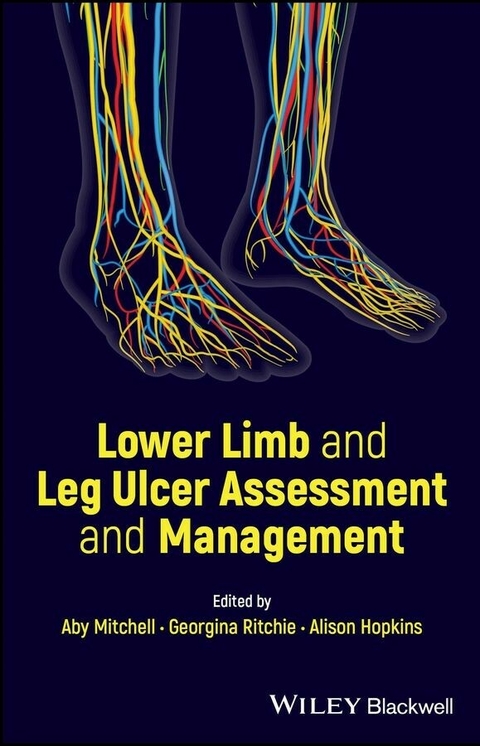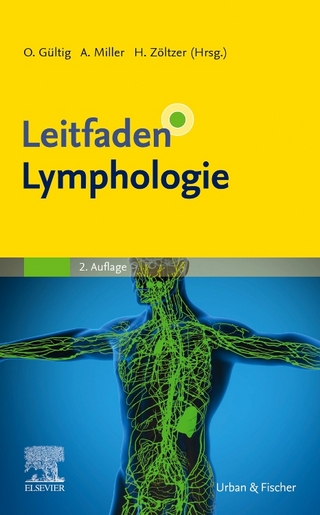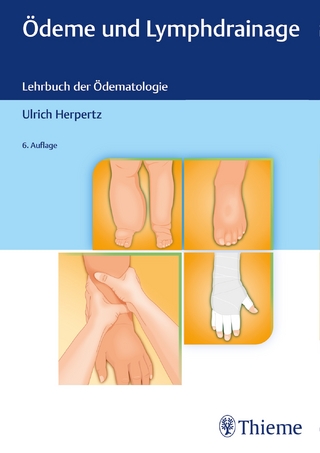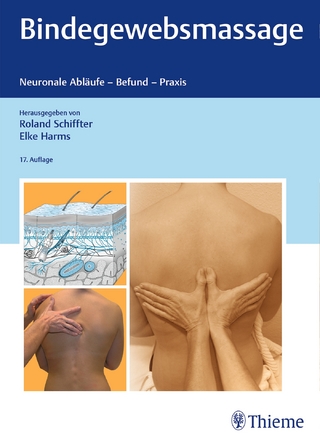
Lower Limb and Leg Ulcer Assessment and Management
Wiley-Blackwell (Verlag)
978-1-119-90821-0 (ISBN)
This comprehensive text challenges the misconception that leg ulcers are invariably ‘chronic’. In practice, proactive management will prevent the harm associated with sub-optimal management. Insights are provided into lower limb assessment, early intervention for ulcer prevention, ulcer types and their causes, along with the influence that swelling and biomechanical changes have on the lower limb. The authors draw on international best practice guidance on lymphoedema, wound pain, wound bed preparation, compression therapy, psychological impact, and evidence-based care to enhance leg ulcer management.
Each chapter aims to facilitate reader comprehension and promote productive patient discussions, empowering healthcare professionals to collaborate with patients and improve leg ulcer management rapidly and effectively.
This multi-disciplinary resource covers:
- Normal venous, arterial, and lymphatic function in the lower leg
- Leg ulceration due to venous hypertension, peripheral arterial disease, and lymphoedema
- Leg ulcers of unusual aetiology, addressing autoimmune and inflammatory disorders such as pyoderma gangrenosum, rheumatoid arthritis, scleroderma, sickle cell, and more
- Musculoskeletal changes in the lower limb, assessment, and management to enhance mobility and calf-muscle function
- Clinical management, with topics like wound management, stages of wound healing, exudate management, holistic assessment including vascular assessment, compression therapy, and Laplace’s law
- Pain management with an emphasis on understanding the complexities and features that exacerbate or diminish the pain response
- The personalisation of care, understanding of social determinants of health, and the role of supportive self-management in lifelong management
For professionals seeking evidence-informed approaches to delivering exceptional care, »Lower Limb and Leg Ulcer Assessment and Management« is an essential companion on the journey to understanding and managing leg ulcers effectively.
Aby Mitchell, Senior Lecturer in Nurse Education, Adult Nursing Department, Florence Nightingale Faculty of Nursing, Midwifery and Palliative Care, King’s College London. Aby’s clinical experience spans across burns and plastics, primary care, and physical health in community mental health. Aby is a registered specialist practitioner in district nursing and has an MSc in Advanced Practice (healthcare education). Aby is committed to improving patient care through nurse education.
Georgina Ritchie, Executive Director and Director of Education at Accelerate. Georgina brings over two decades of experience in clinical practice and education. Her journey from military nursing in the British Army to leadership roles in the NHS and academia has honed her expertise in community and district nursing. Georgina is a registered community specialist practitioner and a V300 non-medical prescriber, holding an MEd, with a passion for empowering confident clinical practice through education.
Alison Hopkins MBE, Executive Director and CEO at Accelerate. With over three decades of experience in wound care, Alison established the leg ulcer service at Tower Hamlet’s District Nursing Service in 1989, beginning a life-long passion for compression therapy and community transformation. In 2019 Alison was awarded an MBE for services to nursing and wound care and holds an MSc in Psychology and Health. In addition to overseeing Accelerate, she continues to contribute to academic journals, and speak at conferences, always seeking to challenge the status quo so that excellent wound and lymphoedema care becomes the norm.
List of Contributors xiii
Foreword xv
Preface xvii
Acknowledgements xx
Introduction 1
Alison Hopkins and Joseph Montgomery
The Wound Care Burden 1
The Cost of Sub-Optimal Wound Care 3
Classification of Dressing Products 4
Dressing Product Analysis 6
Online Non Prescription Services 7
Conclusion 9
References 9
Chapter 1 Aetiology 11
Aby Mitchell
Normal Venous Function 11
Veins in Action 16
Blood Pressure in Veins and Capillaries 17
Venous Disease 18
Pathophysiology of Chronic Venous Disease 19
Theories of Tissue Damage 21
Chronic Venous Insufficiency 23
Risk Factors for Venous Insufficiency 24
Arterial Disease 24
The Skin 33
Wound Healing 35
Phases of Wound Healing 36
Conclusion 39
References 39
Chapter 2 Lymphoedema and Chronic Swelling 43
Caitriona O’Neill and Rhodri Harris
Function of the Lymphatic System 43
Prevalence and Key Facts 48
Causes of and Risk Factors 52
Assessment, Diagnosis and Staging 55
Management Challenges 66
Lymphovenous Disease 68
Treatment 74
Compression Therapy and Assessment Considerations 76
Adjunct Treatment Modalities 79
Surgery 82
Palliative Care 83
Lipoedema 87
Summary 97
References 97
Chapter 3 Atypical Causes of Leg Ulceration 106
Sarah Bradbury and Kirsten Mahoney
Inflammatory/Autoimmune Disorders 107
Metabolic Disorders 134
Malignant/Neoplastic Wounds 145
Drug- Induced Leg Ulcers 155
Erosive Pustular Dermatosis 161
Infective Conditions 172
Conclusion 176
References 177
Chapter 4 Musculoskeletal Factors in Leg Ulcers: Assessment and Management 188
Rona Frances Campbell
Risk Factors 190
Lower Limb Veno-Muscular Pumps 192
Ankle Joint Assessment 196
Holistic History Taking Relating to Factors that Influence Biomechanical Lower Limb Function 198
Management 205
Reducing Falls Risk 216
Allied Health Professionals as Part of the Multidisciplinary Team 218
Conclusion 218
References 219
Chapter 5 Assessment of Leg Ulceration 226
Karen Staines and Aby Mitchell
Assessment 227
History Taking 227
Examination 238
Arterial Disease 248
Wound Assessment 252
Skin Assessment 263
Diagnostic Assessment 265
How to Perform a Handheld Doppler 268
Red Flags for the Urgent Treatment of Patients with Venous Leg Ulcers 276
Reassessment and Recurrence 276
Conclusion 276
References 277
Chapter 6 Holistic Management of Pain 285
Fran Worboys and Alison Hopkins
The Pain Experience 285
Theories of Pain 287
Causes of Pain 292
Types of Pain 293
Pain Cycles: Never- Ending Pain 295
Impact of Pain on People’s Lives 296
Causes of Pain 296
Pain Management Solutions: Assessment 298
Managing Pain 303
Conclusion 312
References 312
Chapter 7 Personalised Care in Leg Ulceration 318
Alison Hopkins and Charlotte Smith
The Wider or Social Determinants of Health 319
Wider Determinants of Engagement with Treatment 324
Making Effective Change 326
What Influences Practitioners’ Decision-Making in Leg Ulcer Management? 329
The influence of Confidence, Courage and Competence 330
A Problematic Culture Within Leg Ulcer Management 332
Challenging Non- compliance 335
Understanding the Lived Experience 338
Support Personal Health Management Through Patient Activation 339
Patient Activation Measure 340
Shared Decision- Making 340
Social Prescribing 342
Motivational Interviewing 342
Supporting Self- Management 343
Legs Matter Coalition: Raising Awareness of Lower Limb Conditions 345
Peer Support Groups 345
Using Positive Language to Promote a Positive Culture 346
Conclusion 347
References 348
Chapter 8 Clinical Management of the Lower Limb 353
Georgina Ritchie
The Case for Early Intervention 360
Clinical Management 360
What Is Compression Therapy and How Does it Work? 372
Anti- inflammatory Action of Compression Therapy 381
Cautions and Contraindications 384
Considering and Commencing Treatment 386
Location of the Ulceration 396
Compression of the Foot 396
Intermittent Pneumatic Compression 397
Wound Bed Preparation and Clinical Management 398
Conclusion 400
References 400
Chapter 9 Lifelong Management 405
Jane Harry
Factors Influencing Venous Ulcer Recurrence 407
Holistic Reassessment Including Ankle Brachial Pressure Index 409
Endovenous Ablation 411
Compression Therapy Systems 411
Assessing for Compression Hosiery 413
Choosing and Prescribing Hosiery 415
Other Considerations when Choosing a Compression Therapy System 423
Empowering Patients’ Self- Management for Leg Ulcer Prevention 434
Knowledge, Staff and Training 439
Public Health 441
Patient Satisfaction and Quality of Life 450
Leg Ulcer Pathways 450
Conclusion 451
References 452
Index 457
| Erscheinungsdatum | 08.05.2024 |
|---|---|
| Verlagsort | Hoboken |
| Sprache | englisch |
| Maße | 193 x 216 mm |
| Gewicht | 680 g |
| Themenwelt | Medizin / Pharmazie ► Medizinische Fachgebiete ► Dermatologie |
| Medizin / Pharmazie ► Medizinische Fachgebiete ► Orthopädie | |
| Physiotherapie / Ergotherapie ► Behandlungstechniken ► Lymphdrainage | |
| Studium ► 2. Studienabschnitt (Klinik) ► Anamnese / Körperliche Untersuchung | |
| ISBN-10 | 1-119-90821-3 / 1119908213 |
| ISBN-13 | 978-1-119-90821-0 / 9781119908210 |
| Zustand | Neuware |
| Informationen gemäß Produktsicherheitsverordnung (GPSR) | |
| Haben Sie eine Frage zum Produkt? |
aus dem Bereich


